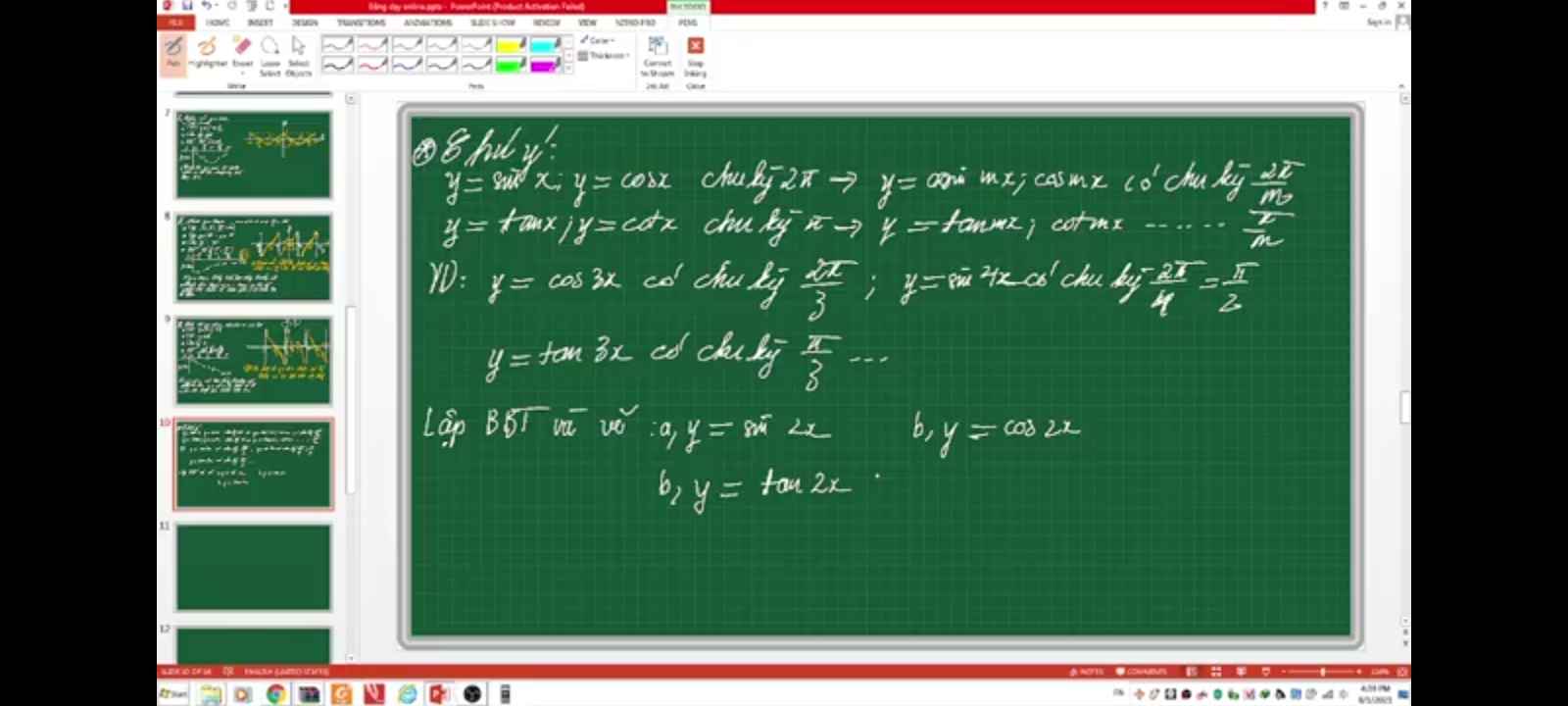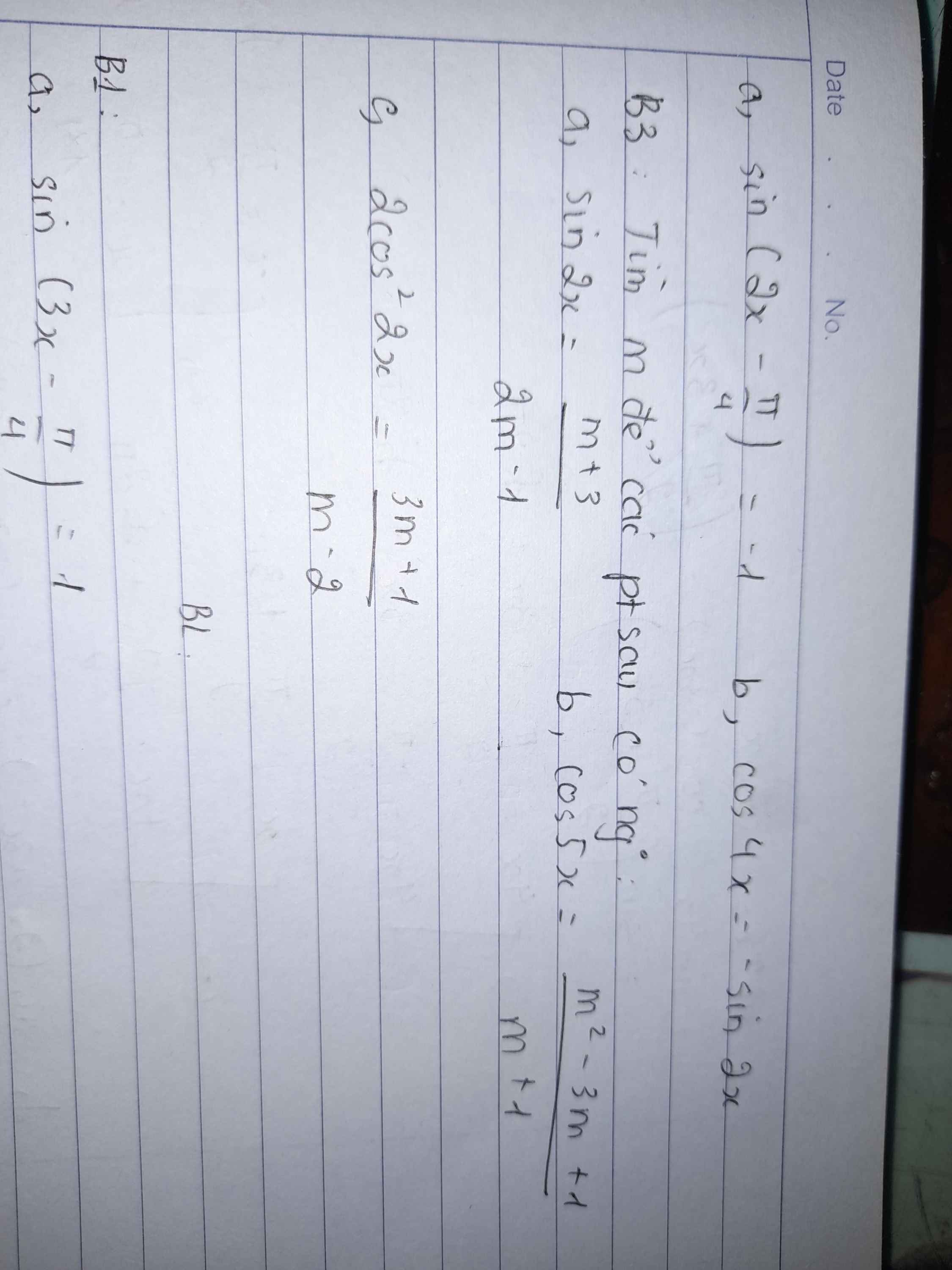
Hãy nhập câu hỏi của bạn vào đây, nếu là tài khoản VIP, bạn sẽ được ưu tiên trả lời.


Câu 5:
\(y=1-\left(sin2x+cos2x\right)^3\)
\(=1-\left[\sqrt{2}sin\left(2x+\dfrac{\pi}{4}\right)\right]^3\)\(=1-2\sqrt{2}.sin^3\left(2x+\dfrac{\pi}{4}\right)\)
Có \(-1\le sin\left(2x+\dfrac{\pi}{4}\right)\le1\)
\(\Leftrightarrow-1\le sin^3\left(2x+\dfrac{\pi}{4}\right)\le1\) \(\Leftrightarrow1+2\sqrt{2}\ge y\ge1-2\sqrt{2}\)
\(\Rightarrow y_{min}=1-2\sqrt{2}\Leftrightarrow sin\left(2x+\dfrac{\pi}{4}\right)=1\)\(\Leftrightarrow x=\dfrac{\pi}{8}+k\pi\left(k\in Z\right)\)
\(\Rightarrow y_{max}=1+2\sqrt{2}\Leftrightarrow sin\left(2x+\dfrac{\pi}{4}\right)=-1\)\(\Leftrightarrow x=\dfrac{-3\pi}{8}+k\pi\left(k\in Z\right)\)
Ý B
Câu 6: Hàm số có TXĐ: D=R
\(y=\sqrt{4-2sin^52x}-8\)
Có \(-1\le sin2x\le1\)
\(\Leftrightarrow-1\le sin^52x\le1\)
\(\Leftrightarrow2\ge-2sin^52x\ge-2\)
\(\Leftrightarrow\)\(\sqrt{6}-8\ge y\ge\sqrt{2}-8\)
Ý A
Câu 7: TXĐ: D=R
\(y=\dfrac{3}{3-\sqrt{1-cosx}}\)
Có \(-1\le cosx\le1\) \(\Leftrightarrow2\ge1-cosx\ge0\) \(\Leftrightarrow3-\sqrt{2}\ge3-\sqrt{1-cosx}\ge3\)
\(\Leftrightarrow\dfrac{3}{3-\sqrt{2}}\le y\le1\)
Vậy \(y_{min}=\dfrac{3}{3-\sqrt{2}}\Leftrightarrow x=\pi+k2\pi\) (k nguyên)
\(y_{max}=1\Leftrightarrow x=k2\pi\) (k nguyên)


a.
Do \(-1\le sin2x\le1\) nên pt có nghiệm khi:
\(-1\le\dfrac{m+3}{2m-1}\le1\) \(\Leftrightarrow\left\{{}\begin{matrix}\dfrac{m+3}{2m-1}+1\ge0\\\dfrac{m+3}{2m-1}-1\le0\end{matrix}\right.\)
\(\Leftrightarrow\left\{{}\begin{matrix}\dfrac{3m+2}{2m-1}\ge0\\\dfrac{4-m}{2m-1}\le0\end{matrix}\right.\)
\(\Leftrightarrow\left[{}\begin{matrix}m\le-\dfrac{2}{3}\\m\ge4\end{matrix}\right.\)

Áp dụng công thức \(\left(\dfrac{1}{v}\right)'=\dfrac{-v'}{v^2}\)
Ta có \(y'=\dfrac{-\left(x^2+x-1\right)'}{\left(x^2+x-1\right)^2}=-\dfrac{\left(2x+1\right)}{\left(x^2+x-1\right)^2}\)

5.
\(sin\left(60^o+2x\right)=-1\)
\(\Leftrightarrow60^o+2x=-90^o+k.360^o\)
\(\Leftrightarrow x=-75^o+k.180^o\)
6.
\(sin\left(2x+1\right)=\dfrac{1}{3}\)
\(\Leftrightarrow\left[{}\begin{matrix}2x+1=arcsin\dfrac{1}{3}+k2\pi\\2x+1=\pi-arcsin\dfrac{1}{3}+k2\pi\end{matrix}\right.\)
\(\Leftrightarrow\left[{}\begin{matrix}x=\dfrac{1}{2}arcsin\dfrac{1}{3}-\dfrac{1}{2}+k\pi\\x=\dfrac{\pi}{2}-\dfrac{1}{2}arcsin\dfrac{1}{3}-\dfrac{1}{2}+k\pi\end{matrix}\right.\)
Cách làm :
sina = \(\dfrac{1}{2}\) ⇔ \(\left[{}\begin{matrix}a=\dfrac{\pi}{6}+k2\pi\\a=\dfrac{5\pi}{6}+k2\pi\end{matrix}\right.\)
sina = \(-\dfrac{\sqrt{3}}{2}\) ⇔ \(\left[{}\begin{matrix}a=-\dfrac{\pi}{3}+k2\pi\\a=\dfrac{4\pi}{3}+k2\pi\end{matrix}\right.\)
sina = 1 ⇔ \(a=\dfrac{\pi}{2}+k.2\pi\)
sina = 0 ⇔ \(a=k\pi\)
sina = -1 ⇔ \(a=-\dfrac{\pi}{2}+k.2\pi\)
sina = \(\dfrac{1}{3}\) ⇔ \(\left[{}\begin{matrix}a=arcsin\left(\dfrac{1}{3}\right)+k2\pi\\a=\pi-arcsin\left(\dfrac{1}{3}\right)+k2\pi\end{matrix}\right.\)
Với a là một đa thức xác định trên R

\(\Leftrightarrow2cosx+2cos3x=cosx-\sqrt{3}sinx\)
\(\Leftrightarrow\dfrac{1}{2}cosx+\dfrac{\sqrt{3}}{2}sinx=-cos3x\)
\(\Leftrightarrow cos\left(x-\dfrac{\pi}{3}\right)=cos\left(\pi-3x\right)\)
\(\Leftrightarrow...\)





